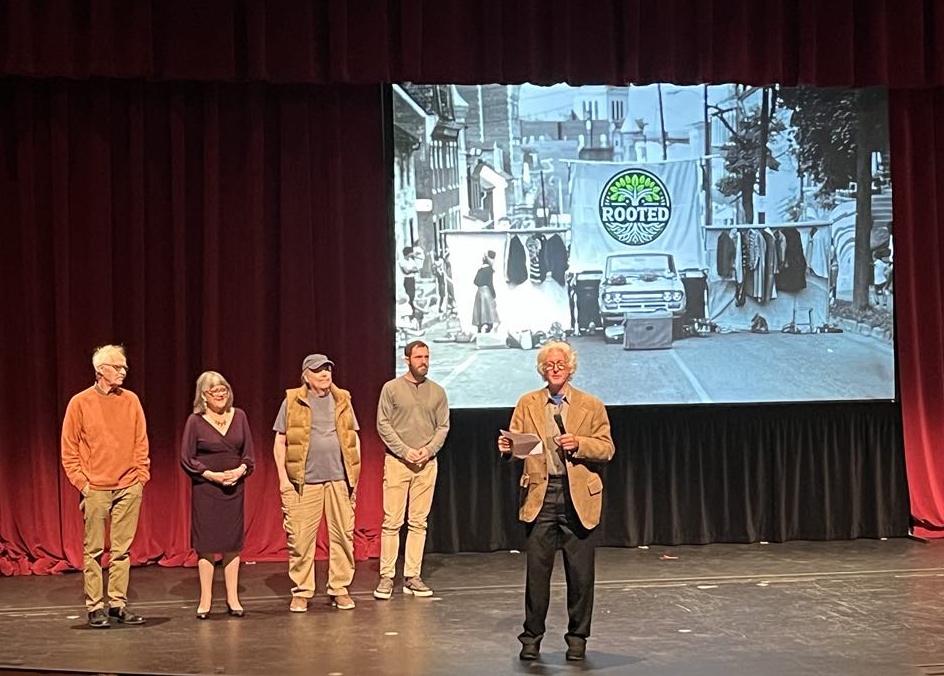"Rooted" makes strong case for the role of arts in community
A fascinating new documentary film looks at how the arts can grow organically in a place and become an integral and nurturing part of the community.
“Rooted,” which premiered at the South Side Film Festival in front of an audience of several hundred people, is an inspiring tale of how a community redefines itself after losing the industry that had once defined it.

Using a metaphor of trees reaching its roots down into the soil and its branches up to the sky, the film makes a stirring argument for cultivating local arts as a way to revitalize a community.
The place is Bethlehem, Pennsylvania, which, beginning in 1850s, had been known as a steel town for being home to Bethlehem Steel, one of the largest steel-making companies in the world and a symbol of America’s manufacturing strength. In the 1970s, the fortunes of Bethlehem Steel were in decline and by 1982, Bethlehem Steel had shut down much of its operations. By 1995, Bethlehem Steel’s main plant in Bethlehem went dark, bringing an end to 140 years of steel-making in Bethlehem.
However during those years of change, more than 30 cultural non-profits, galleries, festivals, and creative businesses grew up in Bethlehem, creating a new identity and re-purposing abandoned structures.
As steel was declining, the arts were growing and the story of that rebirth told in “Rooted” is a template for positive change.
The film grew from a collaboration between SouthSide Film Institute and a group of Bethlehem artists which include Doug Roysdon of Mock Turtle Marionette Theatre; Dave Fry of Godfrey Daniels Folk Music Club; Bill George of Touchstone Theatre and Bridget George of Touchstone and Bach Choir of Bethlehem.
Filmmaker Aidan Gilrain McKenna created the 75-minute documentary drawing from more than 200 hours of interviews with more than 50 artists and community member, archival video of pivotal arts events from throughout the years, music, and photos.
The film’s heartfelt narration by Anisa George, an arborist and daughter of Bill and Bridget George, expands the metaphor of the arts community as trees rooted in Bethlehem’s fertile soil. Tying it all together are seven tree planting ceremonies honoring the artists that are shown in the film, and folk legend John Gorka’s song “Branching Out,” which becomes a defining theme for the film.
Throughout the film, the audience sees the ultimately triumphant struggles of many of the organizations. Godfrey Daniels, which opened in a former doughnut shop in 1976, nearly closed in 1983, but was saved by an emergency fund-raising drive that enabled Godfrey’s to buy its own  building.
building.
Bethlehem’s Ice House which was in disrepair and in danger of being torn down in 1989, was renovated with the city and community’s support into a venue for the arts.
While Touchstone Theatre was founded in 1981 as a traveling professional ensemble creating original movement-based theater, community support allowed it to renovate an abandoned 19th century firehouse into an intimate theater.
The film also touches on the many other arts organizations that have grown or thrived in the dust of Bethlehem Steel, from Bach Choir of Bethlehem, ArtsQuest, Young People's Philharmonic, Pennsylvania Youth Theatre and the commitment to the arts of Lehigh University, through its theater department and Zoellner Arts Center.
Ultimately, “Rooted” is an affirmation of how a strong arts identity can revitalize a community both economically and socially.
The film will be housed at the Special Collections branch of the Lehigh University Libraries as a resource. A trailer for the film can be found at https://youtu.be/Oitodx9hwa4






